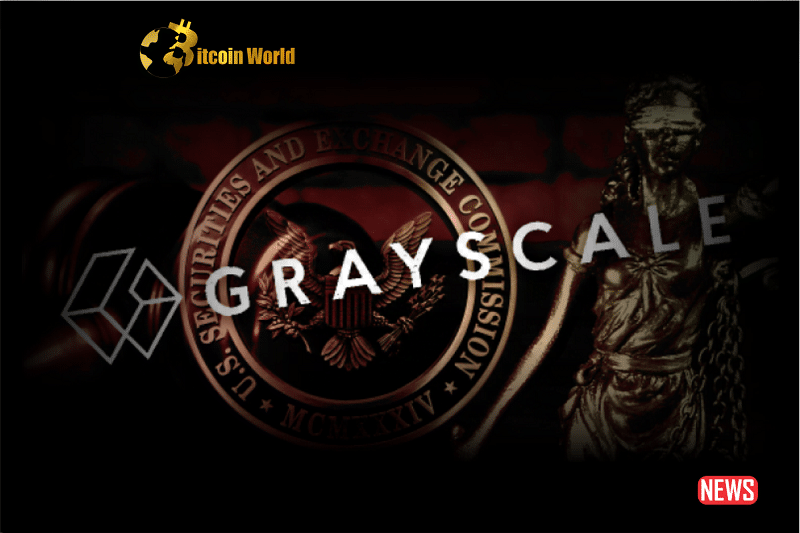The battle for a Bitcoin spot ETF in the US just took another dramatic turn! For years, crypto enthusiasts have eagerly awaited the green light, believing it could open the floodgates for wider institutional adoption. But the Securities and Exchange Commission (SEC) has remained a staunch gatekeeper, repeatedly denying applications. Now, Grayscale, a major player in the digital asset space, isn’t backing down. They’ve officially escalated their fight to the DC Circuit Court of Appeals, arguing that the SEC’s decisions have been anything but fair. So, what’s the core of this legal showdown, and what could it mean for the future of crypto investing?
Why is Grayscale So Upset with the SEC?
At the heart of Grayscale’s appeal is a fundamental question of consistency. They’re pointing a finger at the SEC’s approval of leveraged Bitcoin futures ETFs while simultaneously rejecting their application for a spot Bitcoin ETF. Think of it like this: the SEC has given the go-ahead for an investment product tied to the future price of Bitcoin (futures), but not one that directly holds the actual Bitcoin (spot). Grayscale’s lawyer, Donald Verrilli, minced no words in his letter to the court, highlighting this apparent contradiction. He argues that a leveraged Bitcoin futures ETF – an inherently riskier product due to its amplified exposure – shouldn’t be approved while a straightforward spot ETF is denied. Makes you wonder, doesn’t it?
The Leveraged Futures ETF: The Key to Grayscale’s Argument
Grayscale isn’t against leveraged futures products existing, but they are vehemently contesting the SEC’s rationale. Here’s why the approval of a leveraged Bitcoin futures ETF is so central to their case:
- Higher Risk Profile: Leveraged ETFs amplify both potential gains and losses, making them generally riskier than non-leveraged investments or simply holding the underlying asset.
- Underlying Asset Connection: Both spot and futures ETFs ultimately derive their value from Bitcoin. Grayscale argues that the SEC’s concerns about market manipulation and investor protection should apply equally to both.
- Precedent Setting: Approving a riskier derivative product while blocking the direct asset raises serious questions about the SEC’s criteria and decision-making process.
What are Grayscale’s Main Grievances?
Grayscale’s lawsuit against the SEC isn’t just about one rejected application. It’s about what they perceive as a pattern of unfair treatment. Their core arguments boil down to:
- Arbitrary Differentiation: They believe the SEC is applying different standards to similar Bitcoin investment products without sufficient justification.
- Inconsistent Approval Process: Grayscale highlights the SEC’s 2020 rejection of their spot BTC ETF, citing concerns about market regulation and transparency, and contrasts it with the subsequent approval of a leveraged BTC futures ETF.
- Violation of Regulations: Grayscale alleges the SEC has violated the Administrative Procedure Act and the Investment Company Act by treating different types of Bitcoin products inconsistently.
The Bigger Picture: What’s at Stake?
This legal battle extends far beyond just Grayscale’s ambitions. The outcome could have significant ripple effects throughout the cryptocurrency industry. Consider these potential implications:
- Future of Spot Bitcoin ETFs: A Grayscale victory could pave the way for the approval of other spot Bitcoin ETFs, potentially attracting significant institutional investment.
- Regulatory Clarity: The court’s decision could force the SEC to provide clearer and more consistent guidelines for regulating cryptocurrency investment products.
- Market Development: Increased accessibility to Bitcoin through spot ETFs could lead to a more mature and liquid cryptocurrency market.
- Investor Access: Spot ETFs could offer a more straightforward and potentially less expensive way for investors to gain exposure to Bitcoin compared to existing options.
Why the Hesitation on Spot ETFs? The SEC’s Concerns
The SEC’s reluctance to approve spot Bitcoin ETFs has largely stemmed from concerns about:
- Market Manipulation: The SEC has expressed worries about the potential for manipulation in the underlying Bitcoin spot markets.
- Investor Protection: The agency wants to ensure adequate safeguards are in place to protect investors from fraud and other risks.
- Lack of Surveillance Sharing Agreements: The SEC has sought robust surveillance-sharing agreements with regulated exchanges trading Bitcoin.
Grayscale’s Stand: Seeking a Level Playing Field
Grayscale’s appeal is fundamentally about fairness. They believe that if the SEC is comfortable with the risks associated with leveraged Bitcoin futures ETFs, they should also be comfortable with the risks of a spot Bitcoin ETF, which directly holds the underlying asset. They argue that the SEC’s current stance creates an uneven playing field, hindering the development of a more transparent and accessible cryptocurrency market.
The Road Ahead: What to Expect from the Court Appeal?
The DC Circuit Court of Appeals will now need to consider Grayscale’s arguments and the SEC’s defense. The process could involve:
- Review of Evidence: The court will examine the filings and arguments presented by both sides.
- Oral Arguments: Lawyers for Grayscale and the SEC will likely present their cases in person.
- Judicial Decision: The court will ultimately issue a ruling, which could either uphold the SEC’s decision or side with Grayscale.
- Potential Appeals: Regardless of the outcome, either party could potentially appeal the decision to the Supreme Court.
Grayscale’s decision to challenge the SEC’s rejection underscores their firm belief in the merits of a spot Bitcoin ETF. By highlighting the perceived inconsistencies in the regulatory approach, they are pushing for a more equitable and transparent environment for cryptocurrency investments. The outcome of this appeal will be closely watched by the entire digital asset industry, as it could significantly shape the future landscape of Bitcoin ETFs and the broader regulatory framework governing cryptocurrencies.
Disclaimer: The information provided is not trading advice, Bitcoinworld.co.in holds no liability for any investments made based on the information provided on this page. We strongly recommend independent research and/or consultation with a qualified professional before making any investment decisions.




